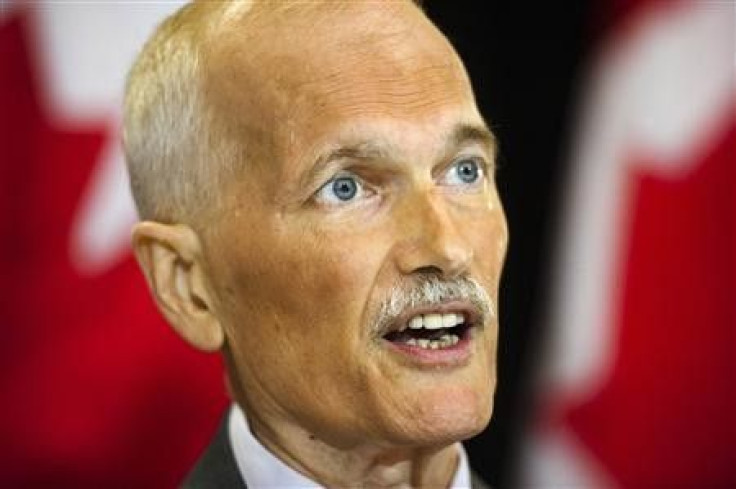Opposition leader Layton steps down to battle cancer

The leader of Canada's main opposition party, limping heavily and looking pale and drawn, said on Monday he would step down temporarily because of cancer but vowed to return once Parliament resumes in mid-September.
It is a second bout of cancer for charismatic Jack Layton, who led his left-leaning New Democratic Party (NDP) to its best ever showing in the May 2 election, leapfrogging ahead of the Liberals to become the second largest party in Parliament after the ruling Conservatives.
But his gaunt appearance prompted questions as to whether he would resume his job.
Layton, 61, was diagnosed with prostate cancer last year, and also fractured his hip in March. He said tests showed he was suffering from a new kind of cancer.
"On the advice of my doctors I'm going to focus on treatment and recovery. I will therefore be taking a temporary leave of absence as leader of the New Democratic Party," he told a news conference in a wavering voice.
"I'm going to fight this cancer now so that I can be back to fight for families when Parliament resumes."
The news means neither of Canada's big opposition parties have a permanent leader -- the Liberals named Bob Rae as interim leader after a crushing defeat on May 2.
NDP president Brian Topp said the party's caucus will meet this week and choose an interim leader by Thursday. The House of Commons will resume on Sept 19.
"I think you could see as I did that Jack has lost a lot of weight and obviously we're very concerned about him," he said.
Layton said he wanted new legislator Nycole Turmel, the chair of the NDP caucus in Parliament, to take over temporarily. Turmel, who is in her late sixties, would not be a candidate in a future leadership race.
"He's trying to provide stability and continuity ... so if he can return in the fall the party will be still poised to go and this will not have caused much grief," said Kathy Brock, a professor of politics at Queen's University in Kingston, Ontario.
"However, he didn't mention what kind of cancer it was, so that is going to raise concerns in people's minds -- especially how fragile he looked -- that he might not be ready to return in the fall," she told Reuters.
Layton's flawless campaign and sympathetic persona helped the NDP capture a record 103 seats in the House of Commons in the May election, up from the 36 when the campaign started.
The Conservatives won 166 seats of the 308 seats and have a majority government.
"Layton mania" was particularly evident in the French-speaking province of Quebec, where the NDP rocketed to 59 seats from just one.
If Layton stepped down permanently, there would be serious questions about whether his successor could maintain the party's popularity among voters, especially those who voted for the leader rather than the NDP platform.
The obvious candidate to replace Layton permanently would be deputy leader Thomas Mulcair, who held the NDP's sole Quebec seat before May 2.
Layton, a former municipal politician, has led the NDP since 2003.
© Copyright Thomson Reuters 2024. All rights reserved.











